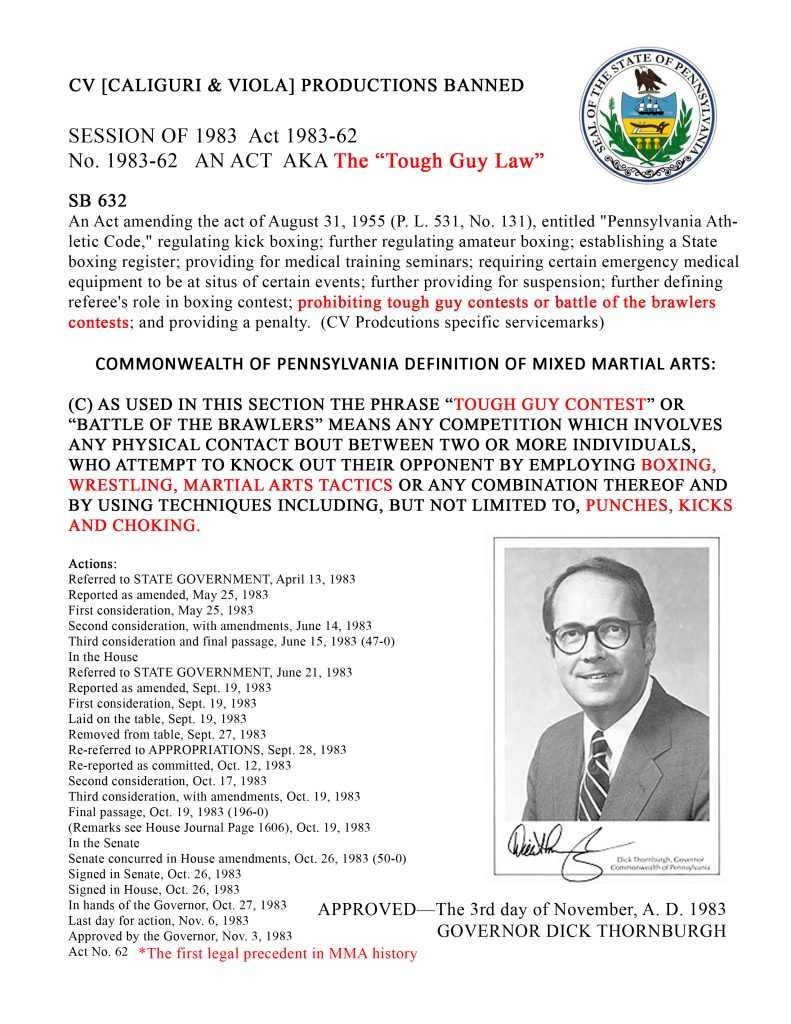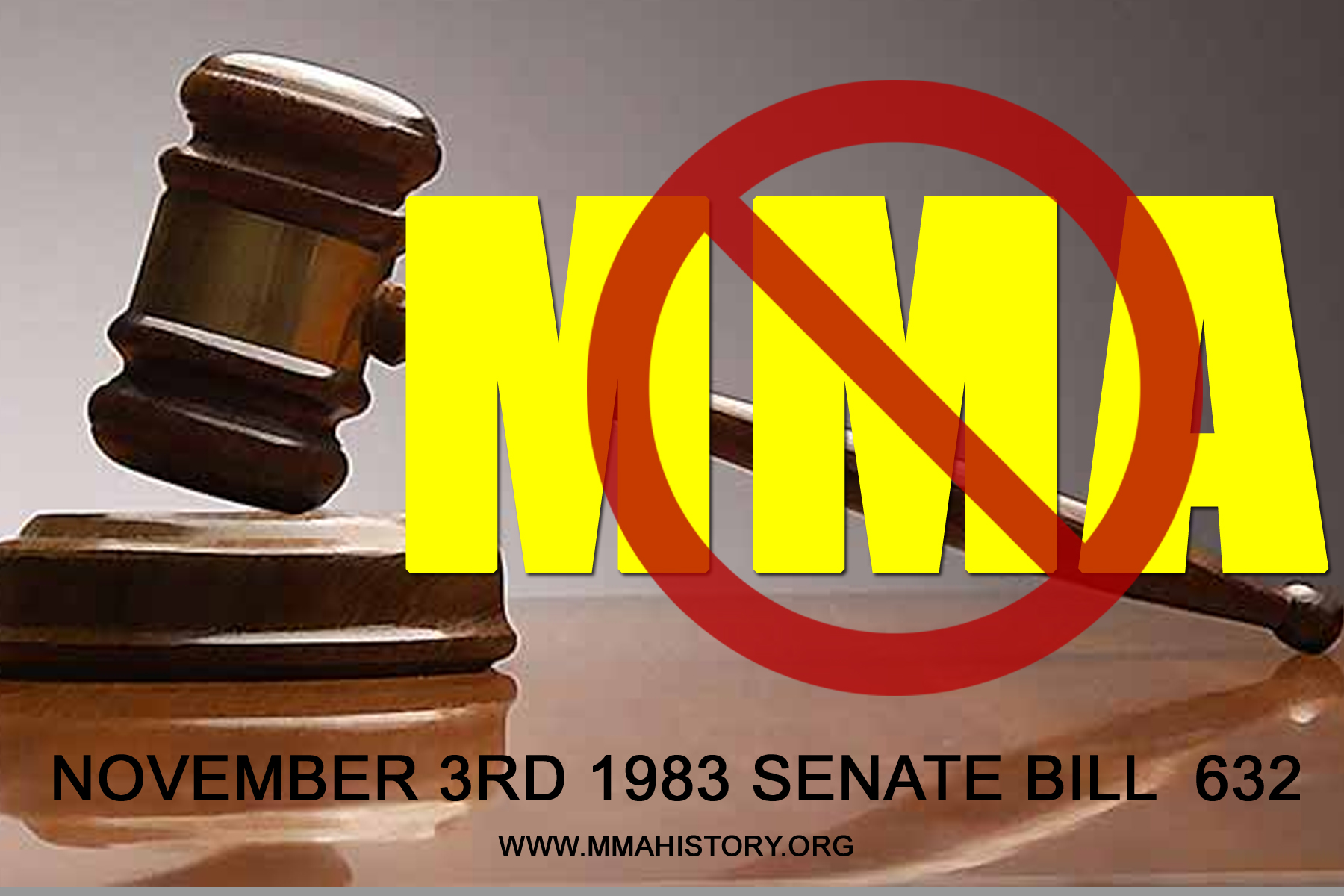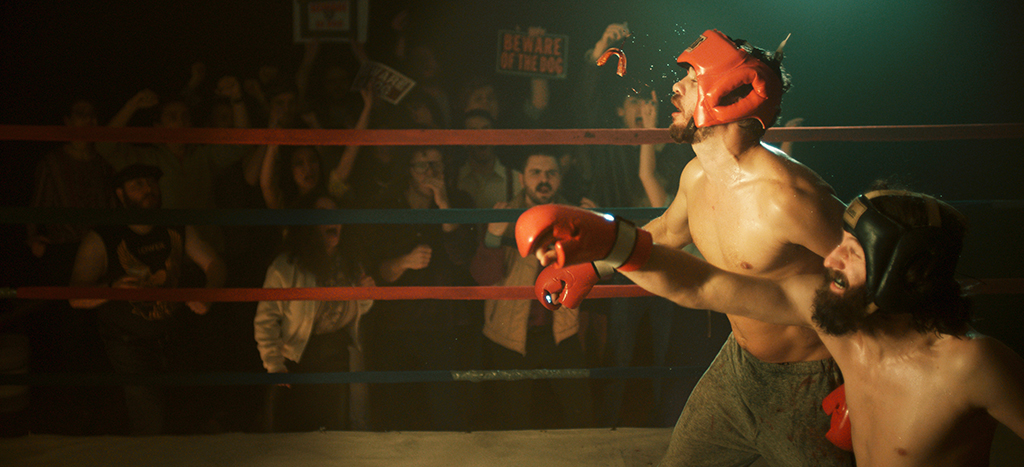The Tough Guy Law
 Q: What is the Tough Guy Law and Tough Guy Bill
Q: What is the Tough Guy Law and Tough Guy Bill
A: According to the Commonwealth of Pennsylvania in 1981, CV Productions service marks: “Tough Guy” & “Battle of Brawlers” events were legally defined as:
“ANY COMPETITION WHICH INVOLVES ANY PHYSICAL CONTACT BOUT BETWEEN TWO OR MORE INDIVIDUALS, WHO ATTEMPT TO KNOCK OUT THEIR OPPONENT BY EMPLOYING BOXING, WRESTLING, MARTIAL ARTS TACTICS OR ANY COMBINATION THEREOF AND BY USING TECHNIQUES INCLUDING, BUT NOT LIMITED TO, PUNCHES, KICKS AND CHOKING.”
The above described “Tough Guy” competitions were the first sanctioned commercial mixed martial arts competitions in America, long before the term MMA was popular.
Session of 1983 Act 1983-62
No. 1983-62 AKA “The Tough Guy Law”
The first MMA Mixed Martial Arts law in history!
 Short Title:
Short Title:
 Actions:
Actions:|
Referred to STATE GOVERNMENT, April 13, 1983
|
||
|
Reported as amended, May 25, 1983
|
||
|
First consideration, May 25, 1983
|
||
|
Second consideration, with amendments, June 14, 1983
|
||
|
Third consideration and final passage, June 15, 1983 (47-0)
|
||
|
In the House
|
||
|
Referred to STATE GOVERNMENT, June 21, 1983
|
||
|
Reported as amended, Sept. 19, 1983
|
||
|
First consideration, Sept. 19, 1983
|
||
|
Laid on the table, Sept. 19, 1983
|
||
|
Removed from table, Sept. 27, 1983
|
||
|
Re-referred to APPROPRIATIONS, Sept. 28, 1983
|
||
|
Re-reported as committed, Oct. 12, 1983
|
||
|
Second consideration, Oct. 17, 1983
|
||
|
Third consideration, with amendments, Oct. 19, 1983
|
||
|
Final passage, Oct. 19, 1983 (196-0)
|
||
|
(Remarks see House Journal Page 1606), Oct. 19, 1983
|
||
|
In the Senate
|
||
|
Senate concurred in House amendments, Oct. 26, 1983 (50-0)
|
||
|
Signed in Senate, Oct. 26, 1983
|
||
|
Signed in House, Oct. 26, 1983
|
||
|
In hands of the Governor, Oct. 27, 1983
|
||
|
Last day for action, Nov. 6, 1983
|
||
|
Approved by the Governor, Nov. 3, 1983
|
||
|
Act No. 62
|
Ten years after the passage of Senate Bill 632, the first Ultimate Fighting Championship (UFC) would debut in 1993.
Other Pennsylvania Mixed Martial Arts Milestones
 CV (Caliguri and Viola) Productions was the first MMA based promotional company in American history, established in 1979 in Pittsburgh, Pennsylvania.
CV (Caliguri and Viola) Productions was the first MMA based promotional company in American history, established in 1979 in Pittsburgh, Pennsylvania.- Bill Viola wrote the first codified set of mixed martial arts rules in 1979; implemented in over 130 bouts. Those standards parallel the unified rules of today.
- The World Martial Arts Fighting Association (WMAFA) sanctioned all CV Productions events and was the first regulatory body for mixed martial arts in the United States.
- CV Productions introduced open regulated mixed martial arts competitions to the United States March 20, 1980 in Pittsburgh, PA with the inaugural “Battle of the Tough Guys” championship. This was the first commercial MMA success and the beginning of a new sport.
- Later in 1980, the Tough Guys were rebranded as Super Fighters to accommodate a professional fighting image: The “Super Fighters League” (SFL). This was the first MMA league of its kind and set the tone for mainstream mixed martial arts.
FYI: Some “Tough Guy” references during the legal process.
Pennsylvania Representative David Richardson was quoted in the December 9, 1981 Legislative Journal referencing the bill stating,
“I would hope that each and every individual would recognize the injustices that were done in this bill. Not only is it not germane, it is unconstitutional and the committee process has been violated by invoking this into SB 742, which was a ‘Tough Guy’ bill and not an abortion bill.” The nickname stuck because even the New York Times referred to the Senate adopted legislation as ‘The Tough Guy Bill’
Here is an exert from a New York Times January 15, 1983 article “A Legislative Battle in Pennsylvania”
In July 1981 Representatives Stephen Freind and Gregg Cunningham introduced in the state General Assembly four bills called the Pennsylvania abortion control act. They were voted down in committee but then one that contained most of the restrictive provisions was attached by the Assembly to a Senate-passed measure known as the tough guy bill, which sought to prohibit amateur prizefights on stages. In December 1981 the omnibus bill was passed by the Assembly by a two-to-one margin and went back to the Senate, which also adopted it. Gov. Dick Thornburgh vetoed it, explaining that he thought it would hamper physicians, but he indicated that he would be willing to consider a revision. The bill was redrafted, voted again and signed.
Background on the Tough Guy Law:
On March 20, 1981 a “Toughman” boxing contest in Johnstown, Pennsylvania resulted in the death of 23-year old Ronald Miller. The event had no affiliation whatsoever with CV’s Tough Guy mixed martial arts competitions. The year prior, Tough Guy had held an event at the same location with no injuries (in fact they had a perfect record of no life-threating injuries). The names “Toughman” and “Tough Guy” was easily confused by the media and certain special interests exploited the fact. It was common knowledge that the boxing hierarchy wanted to ban mixed martial arts due to market share. The controversy served as an outlet to ban the new sport of MMA.
A few excerpts from the book “Godfathers of MMA” (used with permission)
Pennsylvania Legislators were lining up left and right introducing bills to ban Toughman boxing, and rightfully so. Ardore’s guys were trying to make a quick buck and showed zero regard for safety. Freshman senator Democrat Mark Singel, born and raised in Johnstown, was among the politicians who shared outrage with the protesters and constituents in his district. He immediately took aim at Ardore and his operation. According to Chet Czarniak of the Gannett News Service, the Senator was pushing for a 5-year jail term and his original proposal called penalties and fines up to $25,000.
Viola says, “I think the Senator’s intentions were genuine. He was going after the bad guys [Ardore], but was getting one-sided information—the wrong information. Accettulla seized the opportunity by launching a smear campaign behind the scenes that made CV Productions a public enemy. Somewhere along the line the facts mysteriously changed and they targeted us. What started out as a crusade against toughman boxing transformed into legislation to squash mixed martial arts.” An aide for Senator Singel was quoted in the Gettysburg Times June 24, 1981 as saying, “The Pennsylvania Athletic Commission advised the Senator that legislation would be the most effective means of banning the contests in the state.” Viola continues, “Now it all made sense, the senator was getting slanted information from our now arch enemy, the Athletic Commission. It was a classic bait and switch slipped by the public and maybe even the Senator.” Caliguri adds, “The Athletic Commission had been looking for a way to get rid of us legislatively since day one. It was perfect timing for them; they saw an opening with the Ardore Toughman debacle and got other people behind it. It was calculated and systematic.”
The PSAC took advantage of the situation and pumped the media full of half truths. The focus remained on Miller’s death, but attention shifted from Ardore to us instead. That same newspaper article stated the proposed bill would “prohibit ‘tough man’ competitions” but then targeted fighters who “punch, kick and choke each other” instead of boxing.
Viola remembers, “Frank and I wondered, what the hell is going on?” Adore’s Toughman catastrophe was sensationalized in the press, but then completely absent from the bill’s language instead replaced with “Tough Guy” and “Battle of the Brawlers,” CV’s specific trademarks. Viola continues, “The real culprit [Toughman] wasn’t even in the conversation anymore.”
By July 1981, Senate Bill 742 had passed the Senate [44-4] and was moving to the House. Senator Milton Street (brother of the former Mayor of Philadelphia) countered Senator Singel by saying “The state has no right to tell people they can’t climb in the ring and fight for money.”
“Pennsylvania lawmakers were relentless,” says Viola. “Our mixed martial arts format was singled out when another bill was sponsored by Representative William Telek and then another by Senator James Rhoades.” Frank and Bill were stunned. “Accettulla really got his hooks into all of them. The politicians didn’t know the difference between CV Productions and Ardore and the Commission exploited that fact. It felt like a conspiracy and Regis was cheering on every move made by the Senate.
In a bizarre twist, Senate Bill 742 (designed to ban CV Productions) was amended to include anti-abortion legislation. It would seem certain parties tried to manipulate the “toughman” outrage in an effort to mask a controversial abortion agenda. Regardless of its intention, politicians clashed with opposing views.
Representative David Richardson was quoted in the December 9, 1981 Legislative Journal stating, “I would hope that each and every individual would recognize the injustices that were done in this bill. Not only is it not germane, it is unconstitutional and the committee process has been violated by invoking this into SB 742, which was a ‘Tough Guy’ bill and not an abortion bill.” Viola remembers, “The nickname stuck because even the New York Times referred to the Senate adopted legislation as ‘The Tough Guy Bill’ when they reported the story. We were making national headlines for all the wrong reasons.”
CV’s events were now oddly center stage alongside the abortion issue, a totally unrelated topic that had deeply divided the nation. The bill embarked upon a rollercoaster ride passing the House and Senate only to be terminated by Governor Thornburgh’s Veto on December 23, 1981(even though Thornburgh was a pro-life advocate, he found the legislation unconstitutional). Viola says, “The state lost a bid to outlaw us. I guess you can say we dodged a bullet, but they still had plenty of ammunition. I have no idea why abortion was piggy-backed onto a mixed martial arts bill. It makes no sense, but then again does any of the laws targeting us?”
Eventually the abortion legislation was reformulated and passed by the Governor under the “Abortion Control Act” in 1982. Opposition mounted and the case was ultimately heard in front of the United States Supreme Court [Thornburgh v. American College of Obstetricians and Gynecologists, 476 U.S. 747]. Viola recalls, “This was a major case. President Regan asked the justices to overrule Roe v Wade. It sure was a strange way to be associated with a Supreme Court ruling, but all the documentation cites the ‘Tough Guy’ inspired bill as the origin of the act.”
Viola remembers, “The state had aggressively pushed bills through the House and the Senate, but so far so good. Nothing was on the books. Frank and I thought maybe we could begin staging Superfights in some of the other states around us while Pennsylvania was sorted out. We already had written confirmation from all the states we contacted as far away as Washington. When we contacted those states about our intention to do shows there, we were told immediately, ‘You’re on hold, pending further review.’ The good old boy network was in high gear once again.”
The wheels of government turn slowly, but attorney Louis Ceraso’s prediction came true. The wheels rolled right over Bill and Frank. “We were legislated out of existence.” In the 1983 session of the Pennsylvania State Senate, Bill 632 was introduced by Senators Mellow, Singel, O’Connell, Fumo, Musto, and Fisher, “PROHIBITING TOUGH GUY CONTESTS OR BATTLE OF THE BRAWLERS CONTESTS; AND PROVIDING A PENALTY.”
“Miller’s death and its publicity gave Accettulla the extra oomph to shut us down for good. The commission used public outcry to push the bill through, but it was misrepresentation; it was like banning football because of baseball injuries. They harped on Ardore’s ‘Toughman’ fatality but banned the ‘Tough Guy’ competition. This was the same Commission that allowed Ardore to host his disaster. We saw it as a personal grudge against mixed martial arts.” Boxing, which caused the death, was conspicuously absent from the bill.
“What a bunch of hypocrites. A boxer was killed in a boxing event, so their logic was outlawing our sport. It was a complete farce, but a tragic one, capitalizing on Miller’s death to make political hay.”
The bill amended the existing Pennsylvania Athletic Code, established in 1955 to read:
A PERSON COMMITS A MISDEMEANOR OF THE FIRST DEGREE IF HE PROMOTES, SPONSORS OR PARTICIPATES IN ANY MANNER IN STAGING OF, OR THE CONDUCT OF, ANY TOUGH GUY CONTEST OR BATTLE OF THE BRAWLERS OR IN ANY SIMILAR COMPETITION.
In essence, CV Productions’ events were specifically banned by their servicemarks, “Tough Guy Contest” and “Battle of the Brawlers.” Ardore’s claimed servicemark “Toughman” was noticeably absent from the bill’s language. “Frank and I didn’t know whether to be outraged or flattered. With all of the problems Pennsylvania had to deal with, unemployment, crime, the economy, the Harrisburg bigwigs found the time to single us out by name. Were we being persecuted? Judge for yourself.”
The bill specified that not only would the promoters, but any participant could be arrested. That included the venue operators and even the fighters. The media were exempt should they engage in news coverage of any such event or advertising.
Viola says, “It’s interesting that the bill all but defines modern mixed martial arts in its description of prohibited competitions.”
AS USED IN THIS SECTION THE PHRASE “TOUGH GUY CONTEST” OR “BATTLE OF THE BRAWLERS” MEANS ANY COMPETITION WHICH INVOLVES ANY PHYSICAL CONTACT BOUT BETWEEN TWO OR MORE INDIVIDUALS, WHO ATTEMPT TO KNOCK OUT THEIR OPPONENT BY EMPLOYING BOXING, WRESTLING, MARTIAL ARTS TACTICS OR ANY COMBINATION THEREOF AND BY USING TECHNIQUES INCLUDING, BUT NOT LIMITED TO, PUNCHES, KICKS AND CHOKING.
“That highly specific language banning what constituted our bouts should dispel any doubt that in 1980 we pioneered league competition in mixed martial arts.”
Exemptions to the prohibition include contests staged in connection with athletic training programs, amateur or professional contests of the martial arts, and collegiate or scholastic boxing, wrestling, or martial arts contests. The exemption that most rankled Viola and Caliguri reads: AMATEUR OR PROFESSIONAL CONTESTS SANCTIONED BY THE PENNSYLVANIA ATHLETIC COMMISSION. “So, if they get their cut and you kiss their ass, you’re golden.”
Among the six sponsors of the bill, Vincent Fumo was jailed for federal corruption charges, Raphael Musto has been indicted on federal corruption charges, and on January 18, 2013 Robert Mellow began his prison sentence on federal mail fraud and income tax charges surrounding illegal campaign activity.
The Senate Bill was officially amended on May 25th 1983 enroot to setting the first legal precedent for mixed martial arts—ever. Viola laments, “Honestly, I was still holding on to a slight glimmer of hope until that day. The only thing that could save us would be a veto from the Governor.” Just five days earlier, 20th Century Fox celebrated Art Dore and his operation by releasing the movie Tough Enough, starring Dennis Quaid. Viola says, “He takes an old sport, makes it unsafe, people die and Hollywood rewards him with a movie deal. He was treated like a hero and we are still cleaning up his mess in Pennsylvania. What a bunch of bullshit!”
*In 1983, CV Productions sought legal counsel to sue the State of Pennsylvania among other things for violation of the 14th Amendment. Financial constraints hindered the potential lawsuit.




